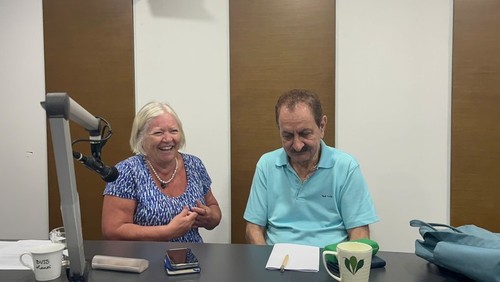 Ms. Elisabeth Dahlin and her husband Andreas Dahlin at VOV5 studio (Photo: VOV) Ms. Elisabeth Dahlin and her husband Andreas Dahlin at VOV5 studio (Photo: VOV) |
Elisabeth’s love for Vietnam has deepened over the years. She worked in Swedish development programs at the Swedish Embassy in Hanoi from 1997 to 2001. Speaking fluent Vietnamese and being familiar with Vietnamese cuisine, she has returned to Vietnam several times with her husband Andreas Dahlin, and maintained close ties with Vietnam, which she affectionately calls her second home.
As Vietnam celebrated its 50th anniversary of southern liberation and national reunification, Sweden presented Vietnam a documentary film ‘Victory Vietnam’, directed by Swedish filmmaker Bo Öhlén. On this occasion, Elisabeth Dahlin and her husband returned to Vietnam to celebrate the joy with Vietnamese people and the friendship between Vietnamese and Swedish people during the past struggle for national liberation and current national development.
In a talk with VOV, Elisabeth remains excited sharing her memories about and love for Vietnam.
Kim Chi: Hi, Elisabeth Dahlin and Andreas Dahlin. Welcome to VOV!
Elisabeth: Well, my name is Elisabeth Dahlin. I am from Sweden, working in and with Vietnam since 1980 in different capacities.
Andreas: Hi, my name is Andreas Dahlin. I first came to Vietnam in 1980 and we stayed here for about four years and then we came back in 1997 and stayed another four years.
Kim Chi: I’m so impressed with your stories about what you have done to support Vietnam and how much you loved Vietnam. This time, you came to Vietnam for the celebration of the 50th anniversary of Vietnam’s national reunification. But 40 years ago, in 1985, you were also in Vietnam for the 10th anniversary. How was the atmosphere at that time? For me, I can’t not remember as I was just a little girl back then.
Elisabeth: Yes, I was. We were there on the 10th anniversary with a youth delegation that was invited. We were in Ho Chi Minh City and the whole city was full of flowers and flags. There was a huge parade and a lot of children, a lot of elderly people. I mean, it was really a manifestation of the whole city, and there was a big reception at the old presidential palace. I’ll never forget that they made a huge dragon of fruits. You could really feel the joy there. I was invited to sing from one of the stages – ‘Mua xuan tren thanh pho Ho Chi Minh’. It was a very joyful celebration.
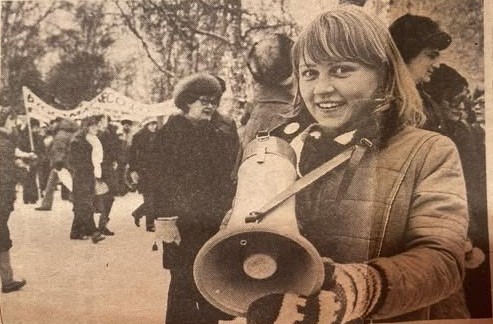 Elisabeth Dahlin joins the movement to protest the war in Vietnam (Photo courtesy of Elisabeth Dahlin) Elisabeth Dahlin joins the movement to protest the war in Vietnam (Photo courtesy of Elisabeth Dahlin) |
Elisabeth Dahlin, born in Lapland in northern Sweden, participated in the 1970s in anti-war and peace rallies for Vietnam at a very young age, joining her parents and sister. At the time, Sweden was one of the first Western nations to establish diplomatic ties with Vietnam and had one of the most active anti-war movements. She said an image that deeply inspired her and fueled her commitment to the anti-war movements was that of then Minister of Education Olof Palme leading a protest march through the streets of Stockholm.
"That was in December 1972. That’s when the bombings took place. There was already a very strong popular movement against the war in Sweden. But then, for the first time, all the different party leaders in our parliament signed a petition to stop the bombings. People in Sweden were outraged by what they saw, people from the churches, from different popular movements, a lot of people who just felt that they wanted to do something. And already there was a cooperation between organizations to see what could be done. And that's when we collected signatures," recalled Elisabeth.
She continued: "At least that way you could show your support, so for a couple of days, we were out collecting signatures. Out of a population of about 8 million, 2.7 million people signed. It was very cold. There was a lot of snow where I lived. But my sister and I were out collecting signatures, my parents were out collecting signatures, my teachers, other students…everybody wanted to contribute."
Kim Chi: Thank you for the strong support that you and your family had for Vietnamese people during those difficult days of the national liberation struggle. Were you a student at that time? What other memories of those days that you still keep today?
Elisabeth: Oh, I was still a student. A high school student. The TV had come, even though it was usually black and white and there were not many channels. But we saw pictures of the girl running with napalm, interviews with people in Vietnam. Those images left an imprint on a generation of people, not just in Sweden, but throughout Europe.
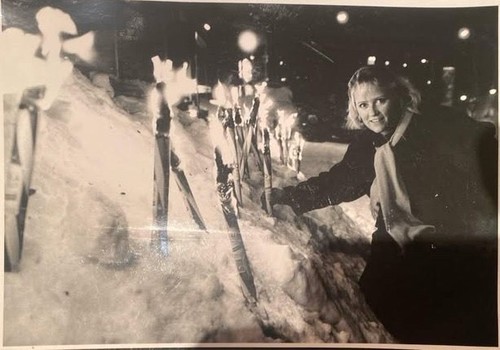 Elizabeth Dahlin has great love for Vietnam (Photo courtesy of Elisabeth Dahlin) Elizabeth Dahlin has great love for Vietnam (Photo courtesy of Elisabeth Dahlin) |
"What we saw and understood was the bombing and the effect of the bombing on people. The situation of children, the situation of people in the countryside. I mean, there were a lot of things on TV and in the newspapers. Media played a very, very important role in our understanding of what was happening. When we arrived, Andreas and I, in 1980, when we landed at Gia Lam airport, we could see the bomb craters in the rice paddies. It was something we had already seen many times. We knew about the Second and First World Wars and what happened in war. That made people in Sweden really want to do something to stop the bombing and change the tragic situation of Vietnamese civilians," said Elisabeth.
Kim Chi: Andrea, what about you? How were those days in your memories?
Andrea: The media, the TV, brought the war in Vietnam into our living room every day. So everybody was conscious of what was going on. In the 70s, US TV reported every day on the Vietnam War. They even had correspondents and journalists on the battlefield in the middle of the fighting. So everything was put in front of people. And people reacted.
Elisabeth: In schools, primary school students, high school students, and other people were wearing little round badges with a blue and red and yellow flag. That was something many students were wearing. It was a sign of solidarity. As Andrea said, thanks to the media, we got timely information, even without social media or Instagram or anything like that. It made people understand how cruel war can be.
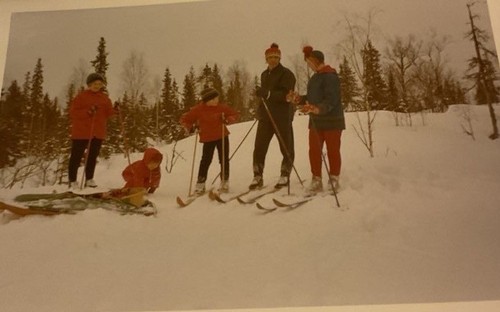 Elisabeth Dahlin's family (Photo courtesy of Elisabeth Dahlin) Elisabeth Dahlin's family (Photo courtesy of Elisabeth Dahlin) |
Deeply moved by the resilience, perseverance, and courage of the Vietnamese people, Elisabeth became even more determined to one day set foot in Vietnam. Eventually, in December 1979, at the age of 21, she came to Hanoi for the very first time.
Elisabeth: Well, actually I came here the first time in 1979 with a youth delegation at the invitation of the Ho Chi Minh Youth Union. So I was here in December 1979 until January 1980. Then we moved here in August 1980 and what motivated that was that we had grown up with the war in Vietnam and feeling the need for justice and peace. I had been selected for a special government program to learn Vietnamese – one year at the University of Stockholm with teachers from Hanoi’s Bach Khoa University, and then one year in Hanoi. We were training to be interpreters, but we also learned a lot about Vietnamese culture and history. The second time I came, I was sent by the government after studying Vietnamese very intensely for one year.
Kim Chi: That’s why you are both fluent in Vietnamese, especially you Elisabeth. I’m very impressed with your very good Vietnamese. And what did you do after that? Did you continue to stay and work in Vietnam?
Elisabeth: And after that, I worked for a year at the Vietnam-Sweden Hospital in Uong Bi. And then the embassy offered me a job, so I moved back to Hanoi.
Kim Chi: So how long did you worked in Hanoi?
Elisabeth: All together over the years, eight and a half years. But I’ve been back and forth to Vietnam in different capacities – as an advisor on WTO accession, and working for children's rights. So I’ve been back to Vietnam, not every year, but very, very often.
Kim Chi: What about you Andreas? How did you connect with Vietnam?
Andreas: I came here in 1980 for love, because Elisabeth wanted to come here to study. So I left the university and followed her. I studied Vietnamese for only six months because SIDA gave me a job administrating the Swedish camp. You see, all the experts working at the children's hospital in Hanoi were living in a big camp behind the Swedish embassy. So I was the administrator for the camp and also made trips to Haiphong to collect supplies – medicine and equipment – for the hospital. We were also helping the camp for the hospital in Uong Bi.
Kim Chi: Having returned to Vietnam many times over the years, what changes have you seen?
Andreas: Now you see new things every day because Vietnam has opened up for tourism. Tourism wasn’t much of a thing when we were here in the 80s. When we came back in 1997, tourism had started up. Now it's booming. A lot of our friends came to Vietnam and passed by word of mouth that Vietnam is a fantastic country. Many Swedes are now coming to Vietnam because Vietnam is open. When our friends come we advise them what to see, what to eat, and so on. Visa regulations are better now. You can stay here for three months without a visa. And it's gotten much easier to travel.
Kim Chi: The close bone between Vietnamese and Swedish people has growing over the years thanks to Swedish people like you and Elisabeth. For those who have not visited Vietnam, with your experience living in Vietnam for many years, what would you suggest them?
Andreas: First of all, Swedish people love sun and the beach, so I would tell them about all the great beaches. And the wonderful cuisine, although Swedish people already know what to expect because many Vietnamese restaurants have opened in Sweden lately. So the sun and the beach – and the cuisine – and then all the many things to see in Vietnam. Historical things, cultural things, the war memorials, and places to visit.
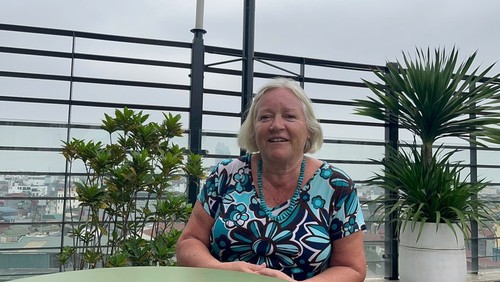 Elisabeth Dahlin and her husband return to Vietnam on the occasion of the 50th anniversary of Vietnam’s national reunification (Photo courtesy of Elisabeth Dahlin) Elisabeth Dahlin and her husband return to Vietnam on the occasion of the 50th anniversary of Vietnam’s national reunification (Photo courtesy of Elisabeth Dahlin) |
Learning Vietnamese, working with Vietnamese people in several projects, and particularly staying in Vietnam for several years have made Andreas and Elisabeth love Vietnam more. Elisabeth says she has also learned to sing Vietnamese songs. She has a passion for Quan Ho folk songs from Bac Ninh. Leaving Vietnam for many years, she still remembers songs like “Beo dat may troi” and “Trong com”.
Elisabeth said she loves Vietnam and considers it her second home, a place where she has found connection and endless inspiration. In addition to singing Vietnamese folk songs, she and Andreas often cook Vietnamese dishes together. Their travels within Vietnam have deepened her appreciation for the warmth and hospitality of the Vietnamese people. Their love for Vietnam has been passed on to their three children.
“My daughter, she was three when she moved here and she learned the first Dan Ca, the first three weeks when she was at home listening to the Dai Phat Thanh. And she, for her, Vietnam is her upbringing. Well, this is for our three kids. That's where they grew up with many, many good Vietnamese friends,” Elisabeth told VOV.
Andreas continued: “She cooks Pho I'm not joking twice a week two times a week, so what she asked us to buy for her not clothes no nothing else. She wanted to buy Pho gia vi, ready-made broth, and all the cinnamon and whatever in a small package that you make for Pho. So we bought 20 pieces because she cooks all the time.”
Elisabeth says: “Yes, she loves Vietnamese food and I think Vietnam is so much part of her heart.”
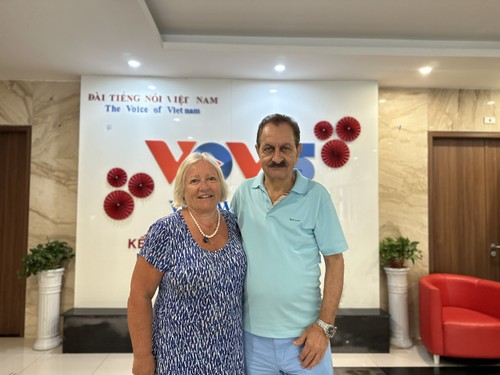 Elisabeth Dahlin and her husband Andreas Dahlin at VOVWorld(Photo: VOV) Elisabeth Dahlin and her husband Andreas Dahlin at VOVWorld(Photo: VOV) |
Having spent their early years surrounded by Vietnamese culture, language, and friendships, Vietnam has become an inseparable part of Andreas and Elisabeth and their children. This bond shows that the family’s connection to Vietnam will live on through the next generation.